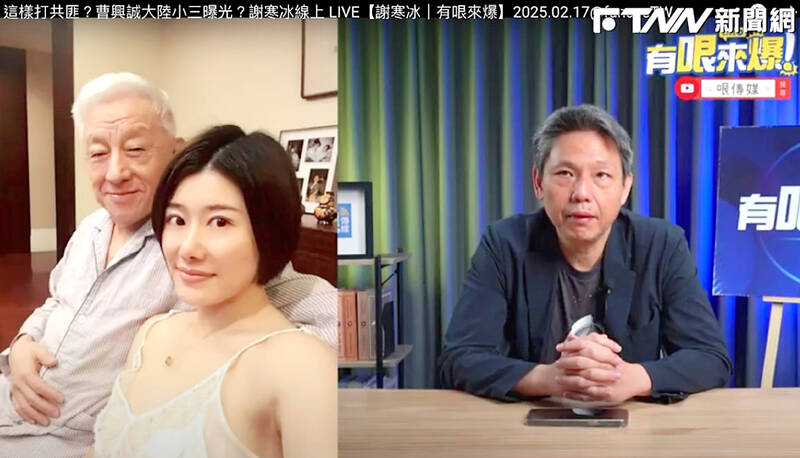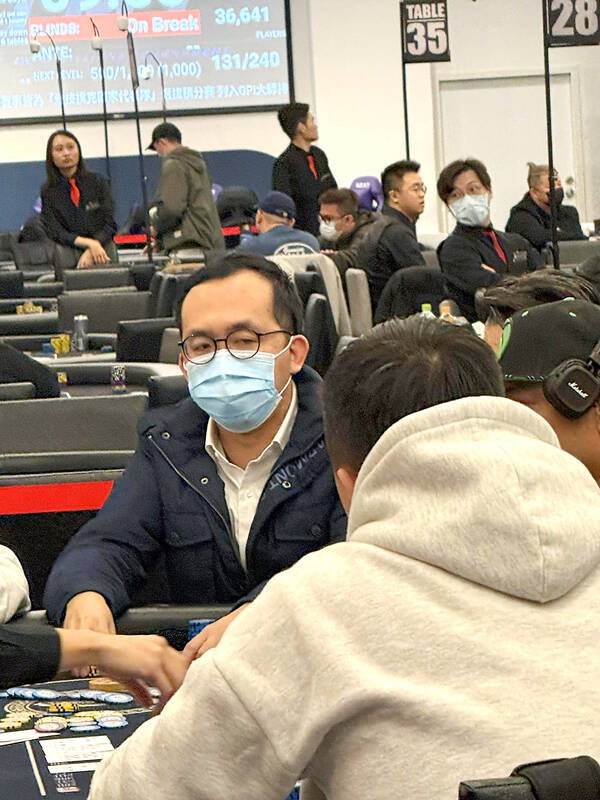The Chinese Communist Party (CCP) frequently produces doctored images using deepfake technology or artificial intelligence (AI) as a smear tactic or to manipulate politics in Taiwan, Mainland Affairs Council Chairman Chiu Chui-cheng (邱垂正) said yesterday.
Chiu was asked about images of United Microelectronics Corp founder Robert Tsao (曹興誠) circulating online that appeared to show he had an intimate relationship with an Asian woman.
Using the images, political commentator Hsieh Han-ping (謝寒冰) accused Tsao of having an affair with a young Chinese woman in 2015.

Photo: screen grab from a livestream of Hsieh Han-ping’s show
However, another commentator, Chang Yi-shan (張益贍), said that analysis by ChatGPT showed that the photos were likely produced using generative AI.
Tsao, who is leading a campaign to recall Chinese Nationalist Party (KMT) lawmakers, including Legislator Hsu Chiao-hsin (徐巧芯), in a statement yesterday said that he has filed a civil lawsuit against Hsieh and is seeking NT$100 million (US$3.05 million) in restitution for spreading fake photos.
Tsao also filed criminal lawsuits against Hsieh for forgery and offenses against reputation and credit.

Photo from Wen Lan-tung’s Facebook page
Chiu told reporters after speaking on a radio program yesterday morning that the CCP has been seeking new and innovative ways to infiltrate and divide Taiwan, adding that the MAC would step up efforts to counter Chinese infiltration and its “united front” work.
“We know that deepfakes and AI can make fake photos and messages that appear to be true, which the CCP frequently uses to disrupt the operation of constitutional democracy and spread anxiety in Taiwan,” Chiu said.
“The government is working to enhance our people’s literacy of online information, particularly those from China,” he added.
Democratic Progressive Party caucus chief executive Rosalia Wu (吳思瑤) said that she supported Tsao’s right to defend his character by filing lawsuits against people who distributed the photos.
Tsao does not hold any public office and personal attacks against him for leading the recall campaign might all come from “one central kitchen,” Wu said, adding that such acts should not be tolerated in a country with rule of law.
KMT think tank deputy director Ling Tao (凌濤) said that the government should investigate the photos, as leaking sensitive intelligence threatens national security.
Meanwhile, Hsu’s husband, Liu Yen-li (劉彥澧), who is head of the Taichung Research, Development and Evaluation Commission, said that he took a day off work to play in a Texas hold’em tournament after a photo of him playing cards was posted on Facebook by political commentator Wen Lan-tung (溫朗東).
The post, which garnered more than 800 comments in less than 24 hours, said that “many Texas hold’em venues are run by gangs and scammers,” and included a picture of the city official seated at a poker table.
Liu told reporters that he asked for leave according to the city government’s regulations to attend the “legal, formal competition championship” last month.
“Because of my role at the Taichung City Government, playing poker has become a political discussion and caused people to question the legality of the game. I will consider my ways and try to improve,” Liu said in a statement.
The photo emerged after Hsu said that Tsao should explain his actions to the public.
Additional reporting by CNA

Taiwan is stepping up plans to create self-sufficient supply chains for combat drones and increase foreign orders from the US to counter China’s numerical superiority, a defense official said on Saturday. Commenting on condition of anonymity, the official said the nation’s armed forces are in agreement with US Admiral Samuel Paparo’s assessment that Taiwan’s military must be prepared to turn the nation’s waters into a “hellscape” for the Chinese People’s Liberation Army (PLA). Paparo, the commander of the US Indo-Pacific Command, reiterated the concept during a Congressional hearing in Washington on Wednesday. He first coined the term in a security conference last

Prosecutors today declined to say who was questioned regarding alleged forgery on petitions to recall Democratic Progressive Party (DPP) legislators, after Chinese-language media earlier reported that members of the Chinese Nationalist Party (KMT) Youth League were brought in for questioning. The Ministry of Justice Investigation Bureau confirmed that two people had been questioned, but did not disclose any further information about the ongoing investigation. KMT Youth League members Lee Hsiao-liang (李孝亮) and Liu Szu-yin (劉思吟) — who are leading the effort to recall DPP caucus chief executive Rosalia Wu (吳思瑤) and Legislator Wu Pei-yi (吳沛憶) — both posted on Facebook saying: “I

The Ministry of Economic Affairs has fined Taobao NT$1.2 million (US$36,912) for advertisements that exceed its approved business scope, requiring the Chinese e-commerce platform to make corrections in the first half of this year or its license may be revoked. Lawmakers have called for stricter enforcement of Chinese e-commerce platforms and measures to prevent China from laundering its goods through Taiwan in response to US President Donald Trump’s heavy tariffs on China. The Legislative Yuan’s Finance Committee met today to discuss policies to prevent China from dumping goods in Taiwan, inviting government agencies to report. Democratic Progressive Party Legislator Kuo Kuo-wen (郭國文) said

The Ministry of Economic Affairs has fined Taobao NT$1.2 million (US$36,900) for advertisements that exceeded its approved business scope and ordered the Chinese e-commerce platform to make corrections in the first half of this year or its license would be revoked. Lawmakers have called for stricter supervision of Chinese e-commerce platforms and more stringent measures to prevent China from laundering its goods through Taiwan as US President Donald Trump’s administration cracks down on origin laundering. The legislature’s Finance Committee yesterday met to discuss policies to prevent China from dumping goods in Taiwan, inviting government agencies to report on the matter. Democratic Progressive Party